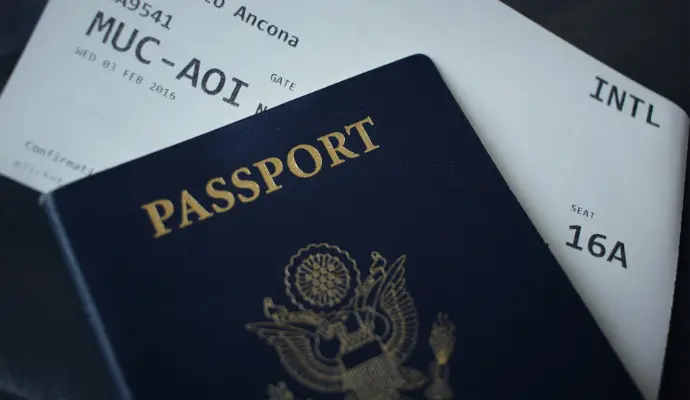🇦🇹 Austria Visa
Austria, with its historical heritage, cultural events, and high living standards, is one of the most visited countries in the Schengen area. Holders of ordinary passports are required to obtain a visa prior to entry to Austria unless they have a valid, multiple-entry Schengen visa; holders of special, service, and diplomatic passports are exempt from visa requirements for stays not exceeding 90 days within 180 days. Whether the trip is for tourism, business, family/friend visits, cultural purposes, or short-term education–internship, the purpose of travel directly affects the content of the application file; therefore, determining the correct visa type, preparing complete documentation, scheduling the biometric appointment on time, and conducting the process in accordance with the procedures of the competent representations are essential for a smooth application process.
📌 Frequently Asked Questions About the Austria Visa
The processing time for Austria visa applications is generally between 4 and 12 working days; during summer and official holidays, this period may extend up to 40 days due to high demand. A valid Schengen visa issued by Austria allows travel to other Schengen countries; however, entering the country that issued the visa first is advisable for the health of future applications. Travel health insurance is mandatory within the Schengen area; it must cover the entire area and have a minimum coverage of 30,000 Euros. In applications with an invitation letter, it should be remembered that the inviting person or company may be contacted by the consulate for verification; at the country border, immigration officers may request hotel and return reservations, proof of travel insurance, evidence of sufficient financial means, and, if required, vaccination/PCR documents. Purchasing flight and accommodation tickets is not mandatory; however, reservations must be valid and consistent with the dates stated in the application file.
📝 Austria Visa Procedures and Regional Jurisdiction
Austria’s representations in Türkiye apply regional jurisdiction for visa applications; depending on the province of residence, applications are submitted through visa centers under the authority of the Embassy in Ankara or the Consulate General in Istanbul. On the day of the appointment, the applicant must be physically present to complete the biometric (VIS) process; if the applicant has not held a valid Schengen visa with VIS records in the last three years, fingerprint data submission is mandatory. The evaluation of applications is entirely at the discretion of the Austrian authorities; Marsel Visa works with the applicant to ensure that the application file is compliant and complete, that the appointment is scheduled, and that the process is tracked effectively.
📌 Required Documents for the Austria Visa 2025
For the Austria visa, the set of documents varies according to the applicant’s professional and financial status as well as the purpose of travel, but there are standard documents required in every file. A full population register record, a copy of the ID card, and two biometric photographs that comply with current measurements and have a white background are essential; the passport must be valid for at least six months after the planned return date and contain at least two blank pages. Bank account statements should cover the last three months, be signed and stamped, and, if applicable, supporting documents such as title deeds, vehicle registrations, or lease agreements showing additional financial strength should be included. Consistency across documents is important; dates in reservations, invitation letters, and statements must match, and Turkish documents should be submitted with sworn and notarized translations where necessary.
Documents According to Professional Status
For employed applicants, an employment leave letter from the workplace, employment entry notification, SGK service record, the last three months’ payslips, and company documents such as activity certificate, tax plate, trade registry gazette, and signature circular are required; for business owners, a company letter on letterhead explaining the travel purpose and dates, company documents, the last three months’ company bank statements, and BAĞ-KUR registration are needed. For public employees, an official duty and leave letter from the institution, three months’ payslips, SGK record, and bank account summary are required; retirees should present a retirement certificate obtained from e-Government and a bank account statement from the bank where the pension is deposited. For freelancers and professional chamber members, a current chamber registration certificate and income-related documents are required; students should submit a current student certificate, a sponsorship letter signed by the sponsor, the sponsor’s professional documents, and a bank account statement showing sufficient balance; housewives and unemployed applicants should provide a sponsor declaration along with the sponsor’s occupational and financial documents. Applicants who are not SGK-registered employees and are self-employed are expected to provide a valid notarized employment contract.
Documents According to Purpose of Travel
For tourist applications, round-trip flight reservations and hotel reservations covering the entire stay and consistent with the application dates are mandatory; for business visits, a commercial invitation from the Austrian company to be visited must clearly state the relationship and purpose of the visit and include the company’s identity details. For family/friend visit applications, the municipality-approved Elektronische Verpflichtungserklärung (EVE) document is preferred; if the EVE cannot be obtained, a personally signed invitation letter in German or English from the inviting person, along with a copy of the inviter’s residence permit or ID/passport and proof of residence such as a rental agreement or residence certificate, must be submitted.
🕒 Visa Processing Time
The average processing time for Austria visa applications ranges between 5 and 15 working days, but may be extended during official holidays and busy periods. Applications made with foreign passports or files requiring additional review may take longer; therefore, it is recommended to apply at least one month before the planned travel date.
📌 Appointment, Biometrics, and Application Flow
When the application file reaches Marsel Visa, documents are checked for consistency and currency; any missing or incorrect points are communicated to the applicant, and the biometric appointment is scheduled after corrections are made. On the appointment day, fingerprint scanning and digital photo submission are completed; for child applicants under 12, personal attendance is not mandatory, but if they are traveling alone, a notarized parental consent letter signed by both parents must be provided. Applicants between the ages of 12 and 18 must be present during the application and submit their biometric data. After the appointment, the file is delivered to the visa unit and the evaluation process begins; during this stage, the representation may request additional documents or an interview.
📌 Visa Fee and Payment Terms
The visa fee consists of the consular fee, the visa application center service fee, and the service fee, and varies depending on the type and duration of the application and the biometric procedure. Application fees are collected as part of the evaluation process regardless of the visa outcome and are non-refundable in the event of refusal; current amounts and payment methods are included in the information note provided by Marsel Visa during the preparation of the application file.
⚠️ Important Considerations
It is important to complete the application at least thirty days before the travel date, to use up-to-date documents prepared close to the appointment date, and to check that the name–surname, passport number, validity dates, and multiple/single-entry indications on the visa are correct. Applications may not be accepted if there is a mismatch between the surname in the passport and ID due to marriage or divorce; therefore, identity and population registration details must be current. For family/friend visit applications, obtaining a municipality-approved invitation is ideal; if this is not possible, the invitation letter and the inviter’s ID–residence documents should convincingly support the file. It should be remembered that the final entry decision at the border belongs to the immigration officers; proof of accommodation and return plans, travel insurance, and evidence of financial means should be readily available for presentation upon entry.
📝 Austria D Visa Types
D-type long-term visas apply to stays exceeding ninety days and cover purposes such as residence, work, education, and family reunification. The process for these applications differs from the Schengen short-term visa; comprehensive document preparation before the appointment, proof of the reason for residence, and compliance with Austrian regulations are required. Additional documents and processing times vary depending on the applicant’s situation; therefore, the process should be initiated well in advance of the planned relocation or long-term stay.
🛂 Schengen Entry and Stay Rules
For trips covering multiple Schengen countries, the application should be made to the country where the longest stay is planned; the first entry should, as a rule, be made to that country. A Schengen visa issued by Austria allows a total stay of up to ninety days within 180 days; this duration and multiple/single-entry conditions are subject to the terms stated on the visa sticker.


